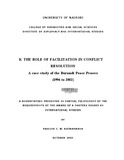| dc.description.abstract | As conflict continues to ravage Africa and the world as a whole, various methods of peace building continue to be used. Increasingly states have pulled out of the process and this has resulted in peace building being left in the hands of nongovernmental organizations and individuals. Less state involvement in peace building has meant less use of violent means of conflict resolution and greater emphasis on non-violent ways of resolving conflicts. Therefore, there has been a decrease in military interventions and increase in the use of methods such as facilitation and mediation. Additionally, there has been a move to encourage conflicting parties to come up with homegrown solutions to resolve their conflicts. This move has seen more and more conflict resolution processes utilize mediators and facilitators. These options are attractive as they give the conflicting parties the chance to sit and discuss the root causes of their conflict and agree on how to resolve it. They guarantee a win-win situation. This study seeks to look at the role facilitation/mediation has played in resolving the conflict in Burundi. It is premised on the hypothesis that facilitation/mediation leads to the resolution of conflict. The study examines the historical aspect of the conflict and the origins of the different rebel groups involved. The study then analyses the different theories of conflict and-the interests of the actors involved in the conflict. This study concludes that to the extent that one of the main objectives of the facilitation in the Burundi peace Process was to end violent conflict and have the various adversaries in the conflict sigh an agreement, then the facilitation was partially successful. However, the facilitation has not been successful in ensuring a total ceasefire. It is this study's recommendation that even as the Implementation Monitoring Committee continues to implement various aspects of the agreement, the facilitator still has a role to ensure that all groups are brought on board to ensure a total cease fire is achieved. This is the first step in ensuring all other aspects of the agreement are implemented expeditiously. | en |

